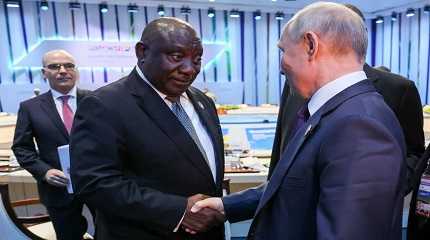
NAIROBI, Kenya (AP) — African leaders have left two days of meetings with Russian President Vladimir Putin with little to show for their requests to resume a deal that kept grain flowing from Ukraine and to find a path to end the war there.
Putin in a press conference late Saturday following the Russia-Africa summit said Russia’s termination of the grain deal earlier this month caused a rise in grain prices that benefits Russian companies. He added that Moscow would share some of those revenues with the “poorest nations.”
That commitment, with no details, follows Putin’s promise to start shipping 25,000 to 50,000 tons of grain for free to each of six African nations in the next three to four months — an amount dwarfed by the 725,000 tons shipped by the U.N. World Food Program to several hungry countries, African and otherwise, under the grain deal. Russia plans to send the free grain to Burkina Faso, Zimbabwe, Mali, Somalia, Eritrea and Central African Republic.
Fewer than 20 of Africa’s 54 heads of state or government attended the Russia summit, while 43 attended the previous gathering in 2019, reflecting concerns over Russia’s invasion of Ukraine even as Moscow seeks more allies on the African continent of 1.3 billion people. Putin praised Africa as a rising center of power in the world, while the Kremlin blamed “outrageous” Western pressure for discouraging some African countries from showing up.
The presidents of Egypt and South Africa were among the most outspoken on the need to resume the grain deal.
“We would like the Black Sea initiative to be implemented and that the Black Sea should be open,” South African President Cyril Ramaphosa said. “We are not here to plead for donations for the African continent.”
African leaders also called clearly for peace.
“This war must end and it can only end on the basis of justice and reason,” said the head of the African Union Commission, Moussa Faki Mahamat. “The disturbances that it causes in the supply of energy and grain must cease immediately” for the benefit of all, especially Africans.
Putin said Russia would analyze African leaders’ peace proposal for Ukraine, whose details have not been publicly shared. But the Russian leader asked: “Why do you ask us to pause fire? We can’t pause fire while we’re being attacked.”
The next significant step in peace efforts instead appears to be a Ukrainian-organized peace summit hosted by Saudi Arabia in August. Russia is not invited.
Africa’s nations make up the largest voting bloc at the United Nations and have been more divided than any other region on General Assembly resolutions criticizing Russia’s actions in Ukraine. Delegations at the summit in St. Petersburg roamed exhibits of weapons, a reminder of Russia’s role as the top arms supplier to the African continent.
But African nations need more concrete results from such meetings, the AU Commission head told the summit.
“The trade balance between Russia and Africa, very unbalanced in favor of the first party, must be improved,” Mahamat said. At the first Russia-Africa Summit in 2019, Putin vowed to double Russia’s trade with the continent within five years. Instead, it has stalled at around $18 billion a year.
In addition, “the strengthening of cooperation on peace and security and the fight against terrorism calls for more deeds and fewer declarations of intent,” Mahamat said, while he and other African leaders were rushing to respond to a coup in Niger that could upend the regional response to a growing threat from Islamic extremist groups.
Putin in his remarks on Saturday also downplayed his absence from the BRICS economic summit in South Africa next month amid a controversy over an arrest warrant issued against him by the International Criminal Court. His presence there, Putin said, is not “more important than my presence here, in Russia.”




